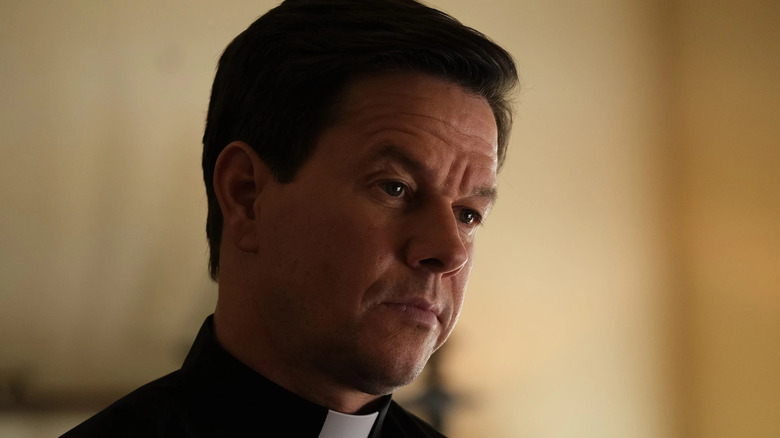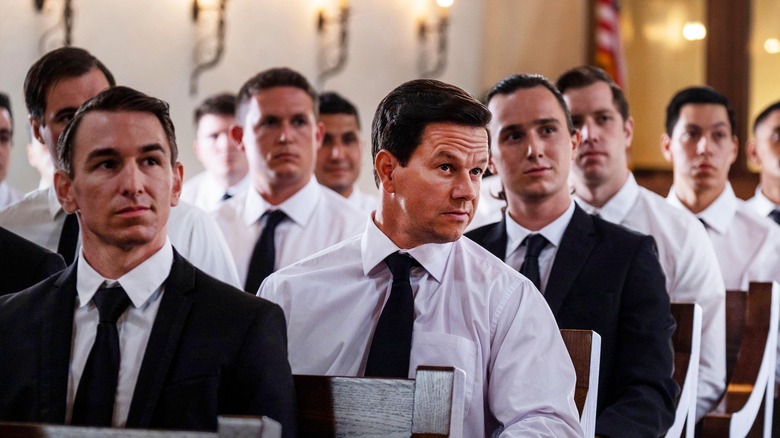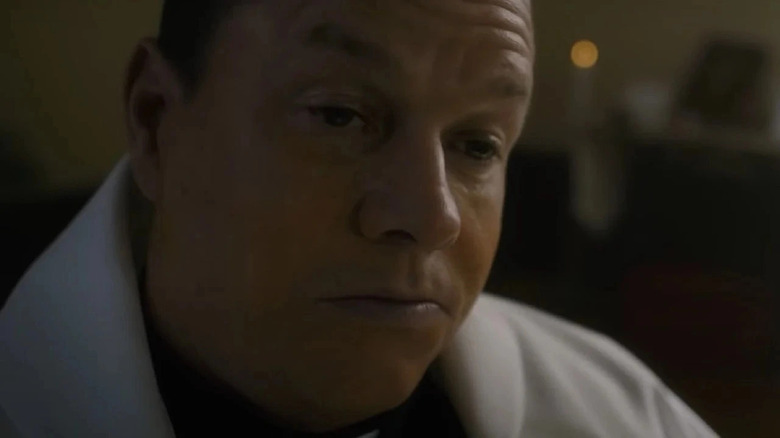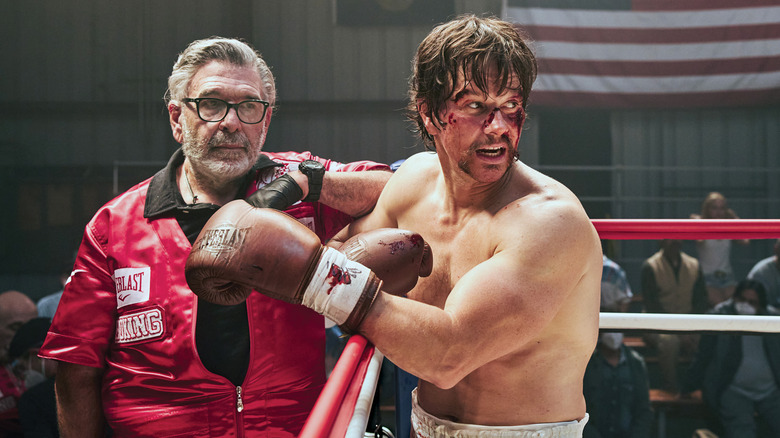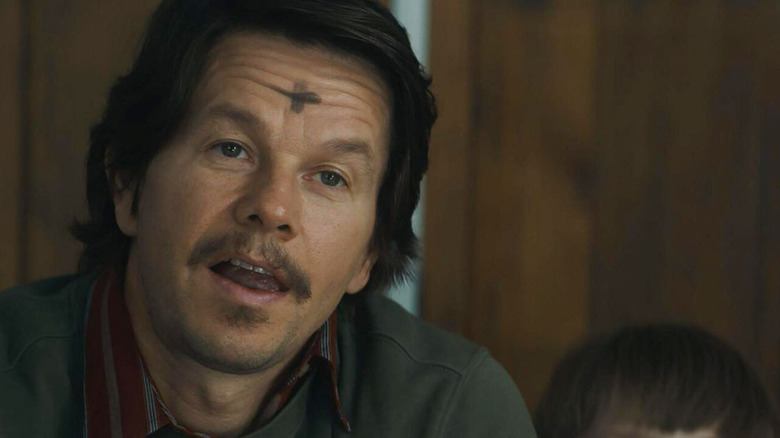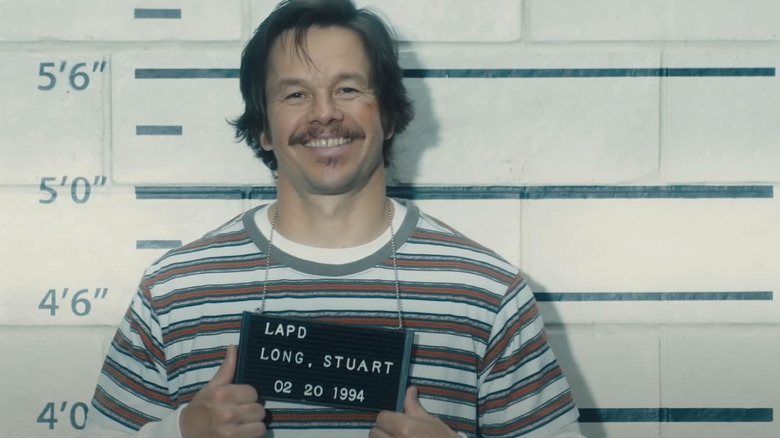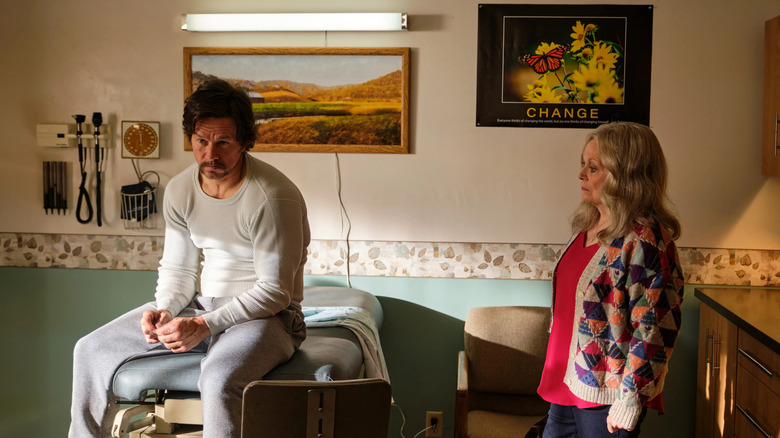How Much Of Mark Wahlberg's Father Stu Is A True Story?
I was talking to another movie buff the other night when the subject of Mark Wahlberg came up. "What," he said, "you mean Marky Mark and the Funky Bunch?" It wasn't the first time I've heard people make snarky comments about Wahlberg's hip hop career before he got into acting, which got me thinking: Why just him? When the name Charlize Theron enters the discussion, no one says, "What, you mean the former winner of the Rooi Rose modeling competition in South Africa?" or makes a wisecrack about Hugh Jackman's previous job as a children's entertainer called Coco the Clown.
I think it's because people are, for whatever reason, still dubious about the talents of a guy who first tasted stardom rapping badly while frequently appearing shirtless with a baseball cap, and that was before using his buff physique to sell underpants. This is weird because he has done more than enough over the past 30 years to prove he is every bit as capable as other actors of his generation, such as Leonardo DiCaprio and Matt Damon. Those two have arguably become more respected, but it's worth remembering that Wahlberg stole the show from both of them in "The Departed."
Maybe it's also because Wahlberg is surprisingly subtle as an actor, something that doesn't immediately square with his previous public personae and unsavory incidents in his past. He is more convincing as blue-collar characters, be it a dishwasher-turned-porn star in "Boogie Nights" or a murderous gym fanatic in "Pain & Gain," than he is playing an astronaut ("Planet of the Apes") or a science teacher ("The Happening"). "Father Stu" is the latest movie to capitalize on his working-class appeal, but how does it stack up against the true story that inspired it?
So what happens in Father Stu again?
"Father Stu" opens with a young Stuart Long (Tenz McCall) dancing to Elvis as his no-good alcoholic father Bill (Mel Gibson) looks on contemptuously. As Bill admits during an AA meeting later in the film, he shot every one of the boy's heroes down hoping one day the boy would admire him.
That troubled relationship with his father is central to the story. We next meet grown-up Stuart (Mark Wahlberg) as an amateur boxer trying to make a go of it at an age when most fighters are considering hanging up their gloves. This is much to the disapproval of his fretful mother Kathleen (Jacki Weaver), who raised him on her own after Bill left. Stu's record in the ring is good, but he's forced to quit because the infections he suffers after a fight could lead to life-threatening complications.
Next up, Stu decides it's time to head to Hollywood for a career in acting instead, working the meat counter at a grocery store until he gets noticed. Stardom doesn't find him, but he reconnects with Bill and gets hit with the thunderbolt when he sees Carmen (Teresa Ruiz) shopping at his store.
He tracks her to a local Catholic church and woos her, but she won't date him unless he's Baptized. In true Stu style, that's a small obstacle and he gets himself dunked. Stu only finds true faith, however, after he suffers a horrendous motorcycle accident and sees a vision of the Virgin Mary.
Once he is fully recovered, he pursues another new career in the priesthood, much to everyone's astonishment. Nevertheless, he manages to convince Monsignor Kelly of the seminary (Malcolm MacDowell) to give him a shot. He proves himself worthy, but he is soon struck down by a rare progressive muscular disease.
Father Stu was a passion project for Mark Wahlberg
"Father Stu" was a real passion project for Mark Wahlberg, who is a devout Catholic in real life. After hearing of the real Stuart Long from two priests he knew, he decided it was a story he needed to put on screen. He initially announced the project in 2016 as a collaboration with David O. Russell before pouring millions of dollars of his own money to get it made. He also went full Method to portray Long in the last years of his life, eating around 7,000 calories each day to pile on 30 pounds, and he even upped the calorie count to 11,000 for the last month of shooting.
When Russell dropped out, the screenwriting and directing duties fell to first-timer Rosalind Ross, co-star Mel Gibson's partner. Unfortunately, she proves out of her depth, largely undoing the hard work of her actors. Wahlberg puts in a tremendously committed performance and he's matched by equally strong turns from Gibson and Jacki Weaver as Stu's parents. The screenplay is repetitive and overly earnest, and the direction is ponderous, making it feel more like a disease-of-the-week TV drama than the "Rocky" of priest movies that it clearly aspires to be.
It's a shame that things didn't work out with Russell, because he has an affinity for quirky underdog characters and even made the tale of a mop inventor compelling in "Joy." He surely would have enlivened Father Stu's inspiring story, and perhaps given it an occasional jolt of irreverence that it sorely needs, but like Wahlberg, he also has a bit of a troubled past. Instead, we get a film that feels rushed but sure takes its sweet time, dragging on without ever giving us any real insight into the spiritual side of Stu's conversion beyond a brief vision of the Virgin Mary.
Sports first seemed like Stuart Long's calling
"Father Stu" is fairly faithful to Stuart Long's early career-hopping, although it condenses his athletics to just boxing. Growing up in Helena, Montana, he excelled in wrestling and football at Capital High, voted "Best Offensive Linesman" after his final season for the team. He also wrestled in numerous championships, finishing runner-up at the Whitehall JV Tourney (via Helena Independent Record). Moving up to Carroll College, Long spent two years in the football team's defensive line. It was a Catholic school but he wasn't Catholic at the time, enjoying interrupting his teachers with ignorant questions about the faith. Father Bart Tolleson remembers (via Catholic News Agency):
"His conversion is phenomenal, from being an agnostic troublemaker to having a mystical encounter with God... Then, he decided to become a priest."
While at Carroll College, Long developed a passion for boxing and built a reputation as a tough fighter. Assistant Coach Palmer Hoovestal remembered:
"I didn't get to know him very well until we boxed together at Carroll. Stu was a big guy, so he wasn't very fast, but he could definitely hit hard. What he lacked in speed he made up for with power. He made it to the workouts and trained hard, but he was more like a Clydesdale than a quarterhorse or a thoroughbred."
Long went on to pursue a pro career, winning the heavyweight title at the 1985 State Novice Championships in Billings. He was due to represent Montana in the Regional Golden Gloves in Salt Lake City but was on a 30-day restriction after getting knocked out in another local title bout the previous weekend. He bounced back the following year to take runner-up in the 1986 regionals before reconstructive jaw surgery forced him to retire.
Father Stu goes to Hollywood
After retiring from boxing, Stuart Long optimistically decides to head out to Hollywood to give acting a shot, with little else to back himself up other than his self-confidence and charm. There is a certain Dirk Diggler-ness to the scenes when he arrives in Los Angeles, checks into a motel, and starts looking for opportunities, including one moment when a sleazy producer tries to give him the casting couch treatment to see how much he wants the part.
In the film, Long's mum Kathleen is far from supportive. She thinks it's just another of her boy's flights of fancy, telling him he doesn't belong in LA, because the people there are all a "bunch of Communist fascist hippies." In reality, Stu's mother was far more encouraging, actually suggesting he go to Hollywood and give it a shot (via History vs Hollywood).
Similarly, his real father Bill was nowhere near as bad as Mel Gibson's character in real life. The disgraced actor may be toxic, but in his later career he has been fantastic at portraying burnt-out hateful men, and he does the same for Stu's neglectful father. The real Mr. Long worked away, but he was still a doting father, and Stu's childhood was pretty happy until his younger brother tragically passed away (via Aleteia).
In the movie, Stu's acting career amounts to a mop commercial. The real Stu's acting career was slightly more successful; beyond commercials, he had a few bit parts and even played the heavy in a TV movie. Long recalled (via History vs Hollywood):
"I was in a CBS movie of the week though... and I had gotten typecast pretty early as the bad guy, like a hitman or something. And [in the movie] I was the head of the neo-Nazi skinhead gang in Los Angeles."
From troublemaker to priest
Just like in the movie, the real Father Stu was a bit of a troublemaker when he was younger and got himself involved in regular fights. Long remembered (via Catholic Voices):
"I lived a very fast life. I was involved in troublemaking. I used to get in street fights a lot. I was very involved in, you know, I used to drink, and I had a lot of problems. I had several accidents, both on my motorcycle and in cars. I had some falls. I hurt myself fighting."
Stu's brutal motorcycle accident is portrayed as the moment that turned the brawling agnostic man towards religion. In reality, he had a whole bunch of serious accidents, but the film focuses on the one that convinced him he had a calling to serve God. His relationship with Carmen is also dramatized, making it appear that Stu initially got Baptized just so he could date her. The real Stu became interested in religion after his accident and became confirmed as a Roman Catholic so he could marry her, as they were already living together at the time of his accident.
The film shows Stu as an impulsive character who goes all-in when he locks on an idea, and the real-life Stu had a similar attitude after he was confirmed. Not content just to be a practicing Catholic, he decided priesthood was the only way to go. It took him 10 years to become a priest, and he was ordained on December 14, 2007. By that time he was already suffering from a debilitating muscle disease and required the aid of crutches to walk (via History vs Hollywood). As the movie shows, his illness initially seemed to halt his progress to becoming a priest before Bishop George Thomas decided to ordain him despite concerns from the seminary (via Pillar Catholic).
Father Stu's illness
In "Father Stu," Stuart Long's deterioration after being struck down with Inclusive Body Myositis (IBM) goes quite quickly, but in reality, 19 years passed from diagnosis to his eventual death. The disease is an incurable condition that started out when Stu had a tumor "the size of a fist" removed from his hip and his health gradually worsened from there.
Although he was ordained as a deacon, his rejection from becoming a priest was devastating for him. He decided to make a pilgrimage to Lourdes in France to see if the shrine's fabled healing waters could cure him. According to his good friend Father Bart Tolleson, Stu "absolutely 100% believed" he would be healed, but he almost fell into the water when he tried standing up from his wheelchair (via Pillar Catholic). On his way back home, Stu visited Notre Dame Cathedral and had a mystical vision when he saw the statue of Joan of Arc, which changed his entire perspective on his illness. "He knew he was being asked if he would carry the disease for Christ," Tolleson remembered, and it's a shame this eventful and enlightening excursion didn't make it into the film.
After he was finally ordained, Father Stu served as a priest for six years before his death, four of them from his last home at the Big Sky Care Center in Helena, Montana, the town where he had grown up. By all accounts, he was a very down-to-earth and good-humored priest who had a lasting positive effect on his community and those who came into contact with him. Despite its flaws, "Father Stu" at least captures that, largely thanks to Mark Wahlberg's commitment to the role.
